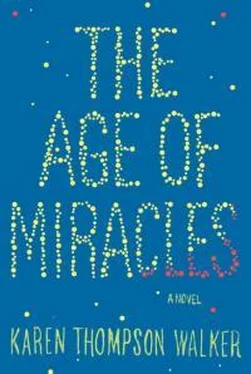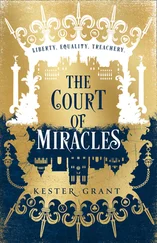“Dad,” I said. “Seriously.”
“You’ll see when you’re older,” he said. “You won’t believe how quickly the years will pass. I feel like I was just here, but it’s been twenty years.”
The tide had risen to my calves. I felt the strong pull of the water against my skin, and it scared me.
“Can we please go now?” I said.
“Okay,” he said. “All right. Let’s go.”
We waded together back through the house and out to the driveway. My father spotted a seagull as we climbed back up to the road.
“Look,” he said, squinting. I hadn’t seen a live one in weeks. It did seem amazing, in that moment, that there had ever existed a creature with the power to fly.
My jeans were sticking to my thighs. The whole car stank of salt water.
“You used to be much braver, you know,” said my father as he started the engine. “You really did. You’re getting to be as bad as your mother.”
And he was right: I had grown into a worrier, a girl on constant guard for catastrophes large and small, for the disappointments I now sensed were hidden all around us right in plain sight.
It happened in the dark: the sweep of the headlights, the quick closing of car doors, the red lights flashing noiselessly at the end of the street.
From my window, I watched three police cars park in a crooked row outside Tom and Carlotta’s house. My first worry, for some reason, was murder. Through my telescope, I spotted Gabby’s mother in a pantsuit, arms crossed and face lit red by the lights, as she stood at the end of her driveway and peered at the house next door. I knelt on the carpet and waited. Minutes passed. It was four in the afternoon clock time, but it was the middle of the natural night. The sky was black and clear, the moon its slimmest, most delicate self. The crickets buzzed, a dog barked, a breeze rustled the eucalyptus trees.
Finally, a woman in white emerged from the house, ghostlike: Carlotta in a nightgown, her long gray hair hanging loose on her shoulders. I could see one of the officers walking beside her, his arm resting on hers. Tom shuffled behind them, his white hair disheveled from sleep.
Both husband and wife had been handcuffed.
Only later were the details of the crime revealed to the neighborhood. A police team spent three hours the next day carting dozens of potted plants out of Tom and Carlotta’s ranch-style and into a giant white truck. The plants were leafy and green, supernaturally healthy. They’d lived their whole lives inside, nurtured by sunlamps, which, we later learned, were powered by the solar panels that glittered on the slopes of the roof. Police officers trudged back and forth across the lawn, packing up whatever they could, even scooping the compost pile into three fat black sacks. When the work was done, I noticed that the small sign in the front yard had been uprooted and was now directing its message to the sky: THIS HOUSE LIVES ON REAL TIME.
According to a rumor that circulated after the arrests, Tom and Carlotta had been growing marijuana undetected for years, but the police had only recently received an anonymous tip from a neighbor. You had to wonder about the timing and whether the caller was motivated, at least in part, by a certain other life choice that Tom and Carlotta had made. There was no way around it: The real-timers made the rest of us uncomfortable. They too often slept while the rest of us worked. They went out when everyone else was asleep. They were a threat to the social order, some said, the first small crumbles of a coming disintegration.
I worried more and more about Sylvia.
Meanwhile, a trickle of real-timers had begun to leave the cities and the suburbs. They were turning up en masse in makeshift communities in the deserts and woodlands of this country. In those early days, they were a tiny, loosely organized minority, a scattering of shadow societies, the earliest advocates of a movement.
By early December, three weeks before Christmas, the days had swelled to forty-two hours. Changes had been detected in the currents of the oceans. Glaciers were melting even faster than before. Certain long-dormant volcanoes had begun to bubble and steam. There were reports that migratory whales were failing to migrate, remaining instead in chilly northern waters. A few fringe experts gave us only a few months to live, but they were roundly dismissed as extremists—as if nothing so extreme could possibly be true.
Meanwhile, colored Christmas lights blinked as usual from the rooflines in our neighborhood, and Mr. Valencia installed on his front lawn the same life-size animatronic manger scene he set up every year. Forests of Christmas trees bloomed at the fairgrounds and in the grocery store parking lots. All the usual carols wafted through the aisles of the drugstores and the malls amid concerns about the health of the holiday shopping season.
My mother and I spent one whole afternoon baking sugar cookies in Christmas shapes.
“It feels good to do something normal,” she said as she flattened the dough with a thick rolling pin. A strand of dark hair kept swimming out from behind her ear. I was glad that her hair was its usual shade again. She’d finally dyed away all the gray.
The Christmas season had turned my mother cheerful. But I felt there was something excessive about her interest that year in the choosing of the ideal noble fir, in the draping of tinsel and the wrapping of presents, the daily marking of the advent calendar. There hummed beneath her good cheer an undercurrent of dread, as if we were conducting each of our annual rituals for the very last time. I sensed it in her constant smoothing of the dining table’s holiday runner, in her glue-gun repair job of a porcelain Santa Claus cookie jar that had lain broken in the closet for years. It was in the way she crouched low on the FoodPlus linoleum as she searched a bottom shelf for the silver sprinkles we used every year but which FoodPlus no longer carried.
“Things change,” she said. “But not everything has to.”
When the last batch of cookies came out of the oven, we filled one whole tin for my grandfather and then divided up the rest for teachers and friends.
“Let’s bring some to Sylvia, too,” I said, leaning on the counter while a buttery scrap of dough dissolved in my mouth. The last batch of stars lay cooling on a rack.
“I don’t think so,” said my mother. She was wrapping each bundle of cookies in green and red cellophane, her fingers working gingerly to preserve the frosting.
“Why not?” I asked.
“It’s not a good idea.”
Both cats appeared at the kitchen door and began to scratch furiously on the glass. They had a taste for sweet things, so they were not allowed inside until the mixing bowls had been washed, the cookie cutters cleaned, the pastry bag emptied and put away.
“But why?” I asked again.
“We didn’t make enough cookies to give them out to everyone we’ve ever met.”
My mother had never forbidden me to talk to Sylvia or the other real-timers. It was never explicitly said. But it didn’t need to be said. I understood well that I was supposed to keep my distance from them, from Sylvia especially. And mostly, that’s exactly what I did.
But I felt sorry for Sylvia, so later that day, when the oven was off and the kitchen cleaned and my mother asleep on the couch, I collected a handful of cookies from our pantry, tied them with red ribbon, and left the house.
I waited a long time on Sylvia’s doorstep before the knob turned and the door swung open, revealing a sleepy Sylvia in a purple silk robe, looking ballerina-thin as she leaned against the doorframe, her hair pulled back in a loose red bun. It was nearly my dinnertime, but the sun was high in the sky—late morning in the natural day.
Читать дальше












